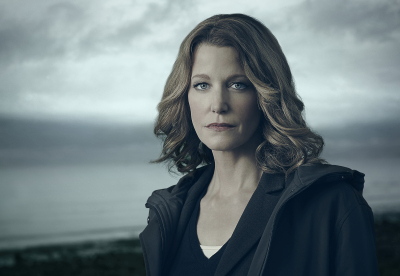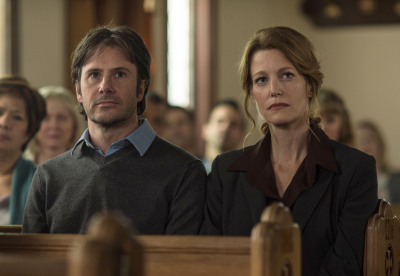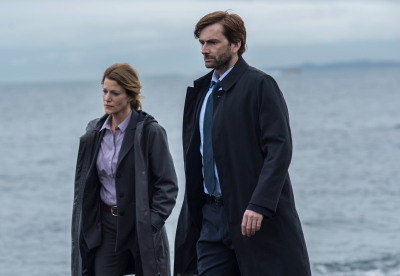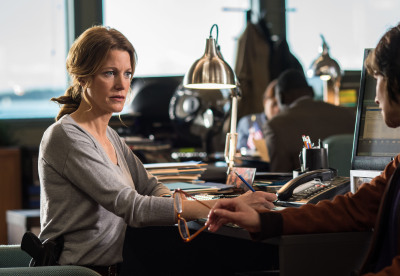Gracepoint’s (FOX, Thursdays, 9/8C) Anna Gunn, who won a couple Emmys for her turn as Skylar White on Breaking Bad, stars as Detective Ellie Miller, one of the detectives investigating the murder of a twelve-year old boy in the coastal town of Gracepoint. Not only is she investigating a horrific crime, she is doing so with the man who took the job she was promised. On top of that, she is a wife and mother to the dead boy’s best friend.
On October 16th, Gunn took part in a conference call Q&A to talk about Ellie Miller and Gracepoint. She talkedabout, among other things, how her character changes over the course of the ten-episode mystery; how she approached the role, and how she chooses projects.
Hi, Anna. I just wanted to say thank you, first of all, for taking your time out today to speak with us, and so, after watching the first two episodes of Gracepoint, we’ve kind of seen Ellie kind of separately as a detective and a mother, but in tonight’s episode we know that Carver is interviewing her son, Tom. I was just wondering (could) you kind of tease how she reacts to having her professional life and her personal life collide even more and if that’s going to provide even more tension between the relationship—in the relationship between her and Carver.
Anna Gunn: Absolutely. I think Ellie is in such an almost an impossible position because she finds herself having to look at the people in her town that she’s grown up with that she’s known all of her life, friends, coworkers even, everybody she’s known and has been close to, and she is somebody who doesn’t believe—she doesn’t approach things obviously in the same way that Carver does. She really, I think believes in the innocence of people until they prove otherwise, until they prove to be otherwise.
And when he insists on talking to her son, it’s just that motherly instinct that any mother would feel. It’s a protective sort of impulse, and she feels like her son has already experienced such trauma because this was his best friend after all. So, I think that it certainly does ramp up the tension between them because she does not understand his way of approaching things and he doesn’t agree with her way of approaching things, but at the same time, he’s her boss and she is in a slightly subordinate position to him.
So, she has to really hold herself together and it’s part of what I love about the character. She’s a really good cop. She’s really good at what she does, but she’s a human being and she’s a deep-feeling person. So, there’s this constant push and pull between what she’s experiencing emotionally internally and what she has to do simply to continue with her job. So, it’s a really tense situation.
I know the show has kind of a dark tone to it. What has been your most difficult or draining scene to film so far if you can tell us without revealing any spoilers?
Anna: Well, there were a lot of scenes that were very emotional and heartbreaking. I mean I have to say that first scene that we shot on the beach when I approach the body of Danny, that was just truly heartbreaking because the director didn’t have us rehearse, and so, in essence, we were coming into the situation with the same kind of feeling that the characters really would have had because you weren’t sure as you approached the scene of the crime what you would see even though I, of course, knew the storyline. It’s just the image. There’s nothing more harrowing or heartbreaking that you can imagine than the death of a child. We all can relate to that, and I remember that being just a devastating scene.
And then, when Virginia Kull runs onto the beach, when Danny’s mom runs onto the beach and you just see this grief pouring out of her, and Virginia, take after take after take, she just did an incredible job because she was just—she was absolutely focused and intense and you could just feel that heartbreak just coming through every cell of her body, and it was just really hard. I was crying in between takes, and there were some scenes that you do where you can sort of drop it in between takes, but that was one day I remember where I just—you can’t help but think of your own kids and other cases that you might have heard of and it’s something that really gets at your heart, and it’s quite hard to drop it sometimes.
I’m curious to know—is there anything as you develop with the character and got into this, is there anything you saw and you were surprised to learn about yourself?
Anna: Yes. Actually, I was surprised to learn when I was doing my research for this, I was helped so much by—I met with three cops, two women who were both mothers because it was important to me to understand that having to balance that particular job and then going home and being a mother, and they were so helpful to me because they talked about having to sometimes witness really harrowing awful things, gruesome things during the day at their job and then having to drive home and try to shed that and walk in the door and be a happy present mother and make dinner for your kids, and I just found that so interesting and there’s no way that I compare acting to actually going through the day-to-day process of being a detective because the other thing I learned is that those people who do those kind of jobs have to almost go against basic human instinct which is to run away from danger. They train themselves to run right towards danger, right into the middle of it, and then, to go home and try to have a good, balanced family life is so difficult, and there are times when I—especially, both with Breaking Bad and with Gracepoint where I would get so immersed in the story because when the writing is that good, you can lose yourself in it. And when you’re going through grief for say 13 hours a day, sometimes it’s a little bit hard to shed that at the end of the day, and so, I learned that that was a similarity, but I also did learn that I’m a very emotional person and Ellie is as well, but she has to shut that down and sort of compartmentalize that in order to do her job, and sometimes it was very difficult to play that duality, but that’s what I’m intrigued by as an actress.
Those are the things I look for in characters. So, no matter what happens in their day, no matter how personally the case they may be working on, detectives have to do that, and I remember these two women were so helpful with me. They said one of the first rules is you never cry in front of your coworkers; if you feel like you’re going to break, you go into the locker room and you let it out there, but you don’t do it on the job. And it was very interesting to me because I found that there would be times when the story would really get to me and I would think but you have to continue—you have to go along, and you have to do your job. So, there were differences, but there were also similarities, and I really—that’s one of the things I really enjoy about acting is that you get to immerse yourself in somebody else’s personality and you do learn things about yourself that you may not have known before.
Kind of a follow-up to the last two questions you answered—you talked about how difficult it can be to kind of clear your head at the end of the day. What do you do personally to kind of shake off that darkness to [indiscernible]?
Anna: Well, it’s interesting. I talked to—one of the people I talked to is a wonderful woman named Ally Jacobs was instrumental in solving the Jaycee Dugard case, and I talked to her a lot. She really collaborated with me a great deal, and I’m eternally grateful to her for that because she really illuminated so many things about the character and about the job for me, and I remember she told me she had about an hour commute home from where she worked, and she said it was really important to her to shed whatever things she had seen during the day and she would listen to—she said, I did whatever it took. I’d listen to music, sometimes it would soft music so I’d calm down. Sometimes it would be really loud music so that I could kind of—crap, sometimes I had to scream in the car on the way home. Sometimes I had to call a friend and have them talk me through it. She said but I did whatever I could so that when I pulled my car into the driveway I knew that I had shed that and I was clear of it and I could walk in the door and say hi, mommy’s home and pick up her kids and give them a hug and know that she wasn’t bringing that into her house.
And I just found that remarkable, and again, in no way do I equate acting with doing a job like that, but I think my kids really taught me that you have to leave that stuff on the set, you can’t take it home. It can’t follow you because you want to be present and you want to be a healthy, happy person for your kids, and sometimes that stuff stays with you a little bit, sort of a residual feeling of those things especially if you’ve been doing a particularly difficult, dark or emotional scene, but it’s a good thing to leave it there.
So, I would do similar things. That was actually interesting. I thought music is a big thing for me, and I use music both to get into the character and sometimes get into the scene, and I also use it to get me out of that mood and maybe pick up my spirits and it’s very, very helpful to me, and then honestly, my kids just—as soon as I see their smiling faces and they run to hug me then the rest of the day goes away and it’s a very lucky thing.
On a more upbeat note—
Anna: Sorry. I don’t mean to be depressing you.
You’ve done mostly drama in your career but also some comedy. Are you more drawn to dramatical or do you just find that’s what comes your way?
Anna: Well, I think as an actor you look for good material first and foremost. So, if it’s in the form of drama, which it has been for a while for me, then that’s where you go, but to me, it doesn’t matter if it’s a comedy or drama and I actually would love to do more comedy. I think my dad would really appreciate it too. He said would you please do something with a little more levity to it, it’s very hard to watch you going through all that.
But I did a play this summer that had a lot of comedy in it, and that was just so much fun to sink my teeth into and I also just did an episode of Portlandia, which is one of my favorite shows on television and I just think they’re so brilliant and so funny and that was the most fun I’ve had in a long time, just to do wacky things and try different things, and they keep the camera running, and we did a run take that was 40 minutes and it felt like 5 minutes because I was having so much fun, and when we cut and they said that was a 40 minute take, I thought that’s impossible. But when you’re having that much fun, it just feels like five minutes went by.
So, I would definitely love to do more comedy, and actually, I find comedy that they say comedy is actually harder than drama sometimes because you can’t be trying to be funny, you have to actually still play the truth of the situation and allow the writing to carry you along, and I think that’s why Fred and Carrie are so brilliant in Portlandia. They play every character or they play sometimes three or four different characters a day and you see them in different wigs and glasses and you come out of the trailer and think who is that and then you go oh, that’s Fred Armisen, who is that. But that’s what they do; they just play it so dead straight and earnest, so earnest, and it was just so much fun to watch people who are the top of their game like that do their thing and Steve Buscemi directed it, and he also played a part in the episode that I did, and it was just—it was a ball. So, I like it all. I really do. I love stage. I love film. I love TV. It’s just wherever the good writing is and the interesting characters are; that’s what draws me in.
I’ve seen the first seven episodes of Gracepoint. I’m absolutely on the edge of my seat to find out how this all wraps up. I’m curious to know what do you feel is about Gracepoint that will resonate well with viewers?
Anna: Well, I think that it can strike people on so many different levels. Certainly, as you say, there’s that mystery, there’s that whodunnit quality to it that’s very gripping and compelling, but it’s also a real character study. You’re watching a small town react to terrible tragedy and what happens to people, how they react in the face of that. It can bring out the best, and it can bring out the worst in people. And when something like this happens in a small town where everybody feels that they know each other, they’ve grown up together, it’s a tightknit community, what I think is really interesting and what will draw viewers in is the fabric of that town starts to get ripped and sort of torn away, and I think it’s something everybody can relate to, what happens to human beings when they’re faced with that kind of crisis.
So, it has a lot of interesting elements to it in terms of the characters, and then, when you have actors like Michael Pena and Nick Nolte and Jacki Weaver, it’s just the crème de la crème of acting, and I would find myself sometimes involved in a scene with Nick or Jacki and for a moment just get lost in it and forget oh wait, I’m actually playing a scene here, I need to be playing my character because I’d be mesmerized by what they were doing. They just immersed themselves so deeply in those roles. So, I think that people will be drawn in by all those things. It really offers so much to the viewer on so many different levels.
You had mentioned at the premiere that you kind of dove right into Broadchurch getting ready to shoot Gracepoint, and I was wondering if you hesitated at all or how did that help or kind of complicate your performance or preparing for it.
Anna: It helped enormously because I was in a theater company in LA when I first moved here and every part was double cast because the artistic director wanted to make sure that it was a 99-seat equity waiver theater, so we weren’t making any money. We were doing it for the love of it, but if somebody got a paying job and needed to go off and do that, then they always had—we would call it our doppelgangers, so there was somebody else to cover the role. What I learned through that was that it was actually very valuable as an actor to rehearse a scene and then hop off stage and watch somebody else get up and do the scene. You had to learn to put your ego aside because actors, it’s an instinct to want to sort of own your role. It’s kind of a territorial instinct, but if you use—if you really embrace the opportunity to step back and watch somebody else’s interpretation of the role and also get to have a really broad view of the story and where your character fits into the storytelling, it’s really actually a great opportunity for an actor.
So, I watched Broadchurch with that kind of viewpoint, and I just really wanted to learn where Ellie’s character fit into the arc of the story, what was most important about various things in the storytelling and also just the essence of who she is, and Olivia Coleman is obviously a brilliant actress, and I thought she was absolutely amazing in the role, but we’re very different actors. So, it never struck me that it would be something that would be haunting me or would be difficult. It’s like plays that get revived. It’s A Streetcar Named Desire has been done how many times, and every time you see a different actor playing Blanche, you see a different—something different comes alive in that. So, I found it actually exciting to be able to watch it and I drew a lot of inspiration from it.
I guess without giving too much away, what do you think audiences will be most surprised to learn about Ellie as the series progresses and she changes?
Anna: I think the most surprising thing that happens to her is that I think in the beginning she and her now boss, Carver, Detective Carver played by David Tennant, at the beginning they approach things so differently. She approaches things with much more of a sense that people are inherently good, and she gives them the benefit of the doubt until they prove her wrong, and she has a much softer approach to what she does. And he really charges in there and has almost a viewpoint that everybody is a suspect and everybody could be guilty and that really bothers her, but as she goes along, I think what surprises her and also surprised me was that she very slowly has to change almost her worldview. She really has to change the way she looks at the world, and it’s a very difficult thing. Going through that process changes a human being.
So, it was a very interesting thing as an actor to investigate and to go through because it’s almost like in a way she goes through a loss of innocence, so I think that’s the surprising thing that you find her going from a person who feels tremendous empathy and does not want to look at anybody in her town with a suspicious eye and then as they go along and they can’t—they’re trying to solve this case and they have such a deep burning desire to make sure that it’s done, and they keep meeting with obstacles. I think she has to slowly change her viewpoint and the way she approaches not only her job but the way she looks at the world. So, that was really fascinating to me.
I have a two-part question for you. First of all, do you have any desire to do a film role right now?
Anna: I do, and I’m looking at some different scripts and I would love to do a film. I’ve been very lucky over the last few years to be doing Deadwood first and then I went right onto Breaking Bad very soon after that, and I’ve done some plays in between my hiatus periods, and I’ve done a few films as well, but the bulk of my time has been spent doing series, and so, I really would love to do a film. I love all different mediums, and it’s really fun as an actor to get to do a play and then get to go back and do a series and then do film work, and it’s all—I go wherever the good writing is, and I go for characters that really interest me or challenge me or take me on a journey that’s a different journey than I’ve ever been on. So, that’s what I’m looking for right now.
And comedy would certainly be a fun thing to do. I just did an episode of Portlandia. I don’t know if I mentioned that, but that was just a—I just had a blast on that. So, I would love to do more of that as well. I’m just looking to do as many varied things as I can and play as many varied roles as I can. So, film is definitely something that we’re looking at right now. So, hopefully, that will—I’ll be able to announce something soon.
Great. With Halloween coming up, I’m curious, do you have a favorite scary movie and why.
Anna: I was just talking about this yesterday with somebody and saying I remember going through a phase when I was a teenager of watching sort of having scary movie film festivals, but I’m so impressionable that—and especially having kids. I don’t know if it’s about having kids now, if it’s just too scary if there’s a child entailed. That’s why doing Gracepoint, it really hits you in the heart because you start to imagine what if this happened to my child and sometimes it can really carry you away.
But I remember very distinctly watching The Shining when I was about 15, and I was at home alone and I just thought ooh, Jack Nicholson, I’ll watch this, and it scared me so much and I’ll never forget the experience. I kept going around and locking all the doors and thinking am I safe here because it was such a psychologically disturbing film. That, to me, is the all-time. I don’t think any movie scares me as much as The Shining.
Wonderful. Thank you so much, Anna.
Anna: You’re welcome.



